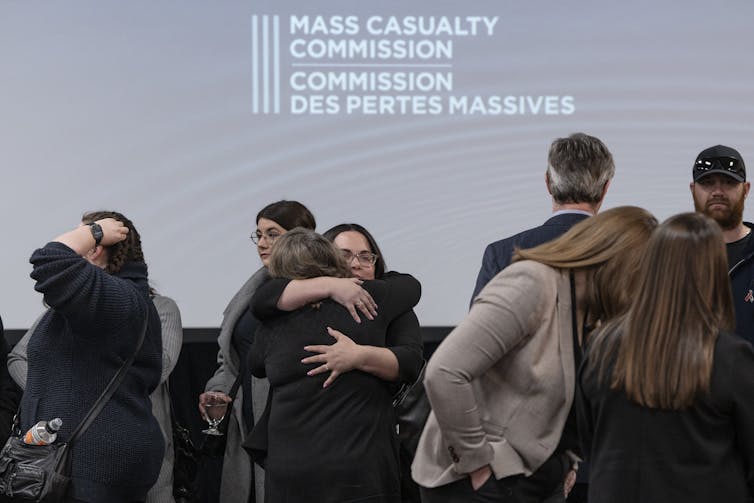Nova Scotia’s Mass Casualty Commission has released its final report on the largest mass murder in Canadian history — highlighting how the perpetrator, although known to the police, was able to escape arrest for charges of intimate partner violence and illegal gun possession.
On April 18-19, 2020, starting in Portapique, N.S., a single gunman murdered 22 people over a 13 hour period while dressed as an RCMP officer and driving a mocked up RCMP cruiser. He was finally shot by police officers at a gas station as he filled up a car taken from one of his last victims.
Nova Scotia’s Mass Casualty Commission calls for stricter gun control laws
The commission’s findings are compiled from submissions, public hearings and police evidence. The final report includes recommendations about how to increase community safety and how to prevent such a tragedy from happening again.
The report also shows how the perpetrator was never held accountable for sexualized violence against women. For example, he was known among sex workers as someone who exchanged dental work for sex and who routinely violated marginalized people, including sex workers.
We have both researched sex work for many years in Canada, the United States and the Philippines.
We were commissioned to do an expert report for the Mass Casualty Commission on sex worker safety in Nova Scotia, focusing on why victims of violence (abuse which was documented by the perpetrator) did not report that violence to the police.
Over a period of three months in 2022, we interviewed 19 executive directors and representatives of social service organizations helping sex workers. We wanted to find out what their experiences were of sex worker safety in Nova Scotia.

THE CANADIAN PRESS/Darren Calabrese
Victims of violence fear they won’t be believed
The quick answer to the question of why victims don’t disclose violence is that most victims do not believe they will be helped if they do come forward.
Sex workers, who are already marginalized, often do not trust the police because of their past dealings with them. Their fear of possible arrest, to be further criminalized and possibly have their children taken away by Child Protective Services is not unfounded. As the final Mass Casualty Commission report states:
“Many women fear disbelief by others, including the police, do not trust that police will ensure their safety, and are concerned about being criminalized or subject to other state harms. These barriers are heightened for marginalized women survivors.”
We heard numerous accounts of victims not being believed when they came forward with stories of abuse, being re-criminalized and not seeing the police or authority figures as trustworthy.
One of the executive directors we interviewed said:
“Sex worker safety is nonexistent, there is no safety measures for sex workers. It’s been “grandfathered down” not to trust the police. [Our agency] also recently did a survey, and it showed that there was more violence from a police officer than of a perpetrator.“
The physical and emotional violence by police was well documented by our interviewees. As one executive director explained:
“The cops abuse, so how are you going to go to this misogynistic institution to report that you’ve been harmed when you are already known or seen as “less than” and found not really worthy of safety anyway?“
Our report documents how the stigma faced by the most marginalized sex workers is one of the key factors in understanding how the perpetrator managed to get away with his prior criminal behaviour.
As another executive director told us:
“What does stigma do? I mean it keeps people in the shadows, it keeps people from coming forward and asking for help.… We don’t respect sex work as legitimate work… People judge sex a lot, and the more you can dehumanize someone, and the more you can deny them basic services, you can deny their social status and respect and rights and a whole bunch of other stuff.”
The level of violence and dehumanization faced by sex workers means that they do not feel protected in the community, at health-care facilities or by police.
Violence resulting from dehumanization was a theme in several of our interviews. Another interviewee told us:
“There’s such a long history of sex workers being on the margins and being treated like whores and sluts and with no value whatsoever. And that long, long history still pervades people’s perceptions of who sex workers are and what sex work is, and I think that those common perceptions run throughout all our systems.”

THE CANADIAN PRESS/Darren Calabrese
Decriminalization as a harm reduction strategy
The final Mass Casualty Commission report highlights how “economic marginalization and criminalization heighten the risk of violence against women and girls.”
In our report, we make eight recommendations that centre on developing a harm reduction strategy to alleviate the harms criminalized sex work poses.
Our recommendations to federal and provincial governments include:
- The decriminalization of sex work.
- Coordinating social services for sex workers across Halifax and rural areas.
- Providing more funding for organizations dealing with sex workers.
- Education to eradicate stigma and dehumanization of sex workers, and to provide anti-racist education.
- Decriminalization of illegal substances for personal use.
- Providing safe and affordable housing.
- A cultural shift around sexualized violence and sex work.
- Poverty reduction and a guaranteed annual income.
Harm reduction means dealing with people where they are, not where we’d like them to be. Harm reduction means deciding what is the greater social harm: sex workers dying on the job or the public recognizing that violence, addiction, homelessness and extreme poverty dehumanize sex workers far more than the actual work does.
Stigma kills, and it denies those who are stigmatized the social supports they need. Harm reduction means that the practice of criminalizing sex work needs to stop in Canada.
By decriminalizing sex work, New Zealand has radically reduced the prevalence of nearly all the social problems we named in this article. It’s time Canada did the same.



